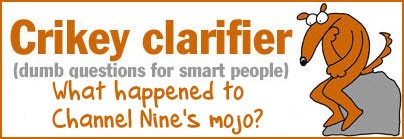It’s a tale of two TV networks. One network, the one you read about in the entertainment pages, has its mojo back after five years in the ratings wilderness.
The Voice was a smash; the Olympics were a triumph; NRL rights have been stitched up for the next five years. The other network, the one you read about in the business pages, is a financial mess, drowning in debt and in real danger of going into receivership.
Both networks are Channel Nine.
So what’s actually going on at the former money-making machine? And what’s at stake? Crikey asked the experts …
What’s the problem?
Nine’s owner, private equity firm CVC Asia Pacific, owes lenders a whopping $3.8 billion in debt and $2.8 billion of it has to be repaid or refinanced by February.
First though, Nine is likely to breach a covenant relating to its debt-to-earnings ratio at the end of this month. This could, theoretically, lead to the company being put into receivership — but that is not yet in the interests of CVC or the two hedge funds that own 80% of Nine’s debt, Apollo Management and Oaktree Capital. If CVC can’t refinance Nine’s balance sheet ahead of February, it is likely to lose control to hedge funds Apollo Global Management and Oaktree Capital.
How did we get here?
In 2006, following the death of his father Kerry, James Packer sold 50% of PBL Media — home to assets including Channel Nine, ACP Magazines, Ninemsn and Ticketek — to CVC for $3.6 billion. A year later, Packer sold CVC another 25% of the company for $526 million.
That decision has been an unequivocal disaster for CVC. The company has lost $1.8 billion on its original investment — the largest-ever loss on a single buyout deal in the Asia region.
The reason for the networks woes is simple, says media analyst Peter Cox. CVC was a victim of the same hubris that saw Alan Bond, Christopher Skase and Frank Lowy blow billions on TV networks in the 1980s.
“CVC paid too much for it and it was financed out of debt,” he said. “”It will be one of the biggest ever failures for a private equity fund — it’s highly embarrassing for them.
“I did a whole lot of TV interviews at the time saying they’ve paid too much. It’s the Wall Street greed approach — they think they’re smarter than the universe.”
Media analyst Steve Allen said: “There’s an old saying that’s been around for 30 years: buy when the Packers are buying and sell when the Packers are selling. They should have stuck to that.”
While CVC undoubtedly paid too much, circumstances haven’t been kind either. The firm’s entry into the Australian media market coincided almost perfectly with the onslaught of the global financial crisis. The GFC had — and continues to have — a deleterious impact on advertising revenues for all media companies. Channel Seven, led by ex-Nine boss David Leckie, has also won every ratings year since 2007 thanks to superior programming.
Where to now?
According to Allen, the most likely outcome is that the hedge funds end up taking control of Nine in a debt-for-equity swap. For all the parties — but especially CVC — it’s about minimising losses.
“Everyone is going to have to take a bath,” said Allen. “If there is no agreement, receivership is the only option and everyone loses big time. It’s in everyone’s interest to find a solution.”
That solution is the sticking point. Last week CVC and Goldman Sachs — which have formed an alliance — proposed that the hedge funds be given a 70% stake in Nine in exchange for waiving $1 billion in loans. Mezzanine debt holders including Goldman Sachs would take a 30% stake.
Allen, who describes the proposal as “outrageous”, says this bid was a classic ambit claim. Oaktree and Apollo hit back with an alternative proposal that would give them control and leave CVC and Goldman Sachs with no equity in the company.
A solution between these two extremes, with more argy bargy leading up to the February deadline, seems the most likely outcome.
Not that this would be the end of Nine’s ownership uncertainty. Oaktree and Apollo are short-term investors who would be expected to quickly sell off the company or put it up for public listing.
In the meantime, Cox says Nine should continue selling off assets following its successful $525 million deal to offload ACP Magazines to Bauer Media. Selling off Ticketek and Sydney’s Acer Arena would help get the company’s debt down further, but neither has excited the market. CVC, Cox says, is likely to only get one Bauer in its lifetime.








Yep… James Packer’s “new broom sweeps clean” decision to replace Leckie and company with young guns was a disastrous move, and Kerry Stokes was astute enough to grab them for the Seven network — and they’ve reaped the rewards ever since.
It was only ever a matter of time after that monumental error of judgement, bowing out of television was a smart move for Packer once he realised.